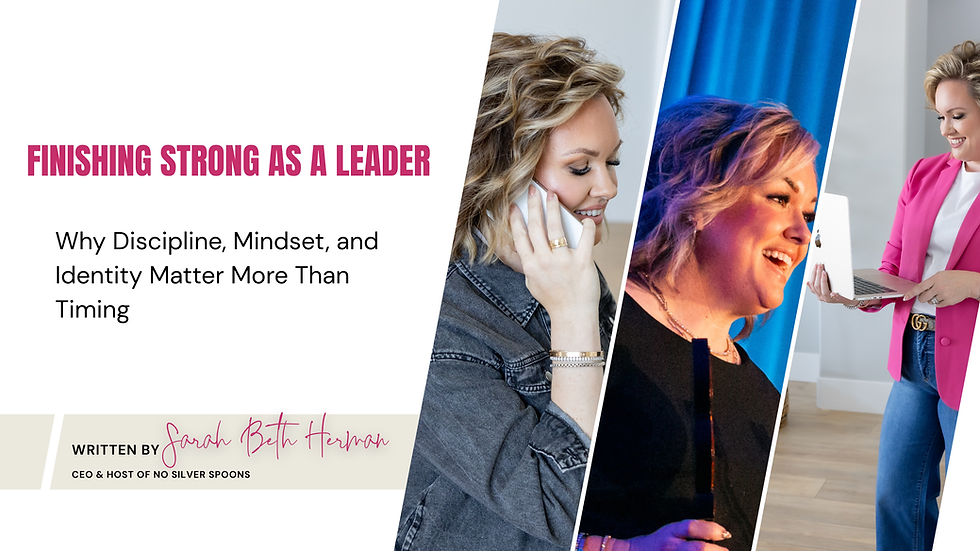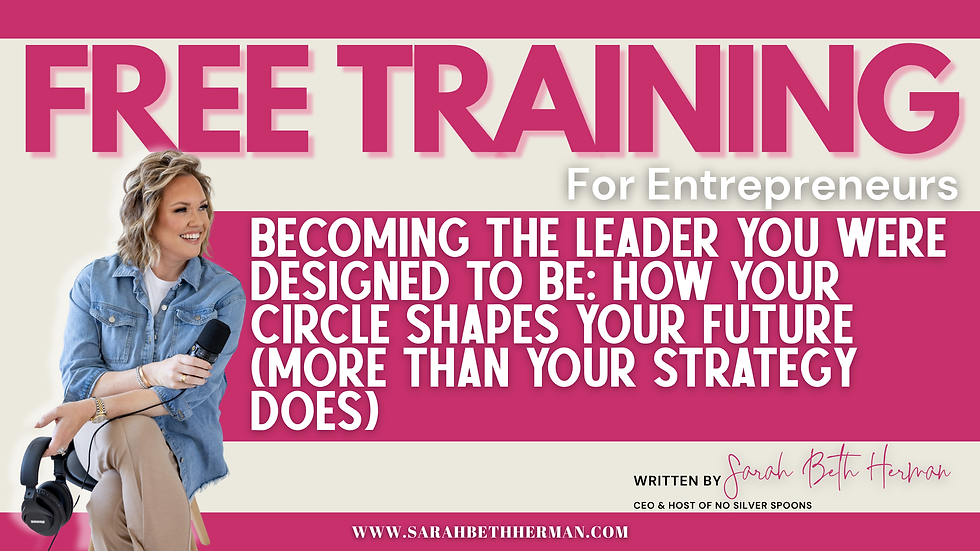How to Stay Committed to Your Vision When Business Gets Hard
- Sarah Beth Herman

- Oct 30
- 6 min read
A Free Training for Entrepreneurs, Visionaries, and Virtual Leaders
By Sarah Beth Herman | 8-Figure CEO, Mentor, and Host of No Silver Spoons®

Every entrepreneur hits a point where it feels like the dream costs more than it gives back. The late nights, the uncertain numbers, the team changes, the self-doubt. That point — the one where you could walk away and nobody would blame you — is the crossroads where true leadership starts.
If you’re here, reading this free training, you already know this series isn’t about hype or hustle. It’s about building something that lasts. This post sets you up for Week 5 of the Keep Going series from the No Silver Spoons Podcast, which releases Monday. Before you listen, I want to give you a leadership truth that will help you not just get through your hard seasons but lead through them.
The Reality of Leadership
Leadership, whether you’re running a business, a team, or your household, will always come with resistance. Growth will test every layer of your foundation — your patience, your purpose, and your people skills.
Maybe you’ve just had a client back out of a deal you were counting on. Maybe a partner isn’t pulling their weight. Maybe you’re growing faster than you expected and the pressure feels heavy.
Those are not signs to quit. They’re signs to stabilize.
The most powerful entrepreneurs aren’t the ones who never face hardship — they’re the ones who know how to stay steady in the middle of it.
At Sarah Beth Herman Mentorship, I teach leaders to build business structures and personal systems that keep them grounded. Because endurance doesn’t just come from motivation — it comes from clarity, integrity, and an anchored vision.
What It Means to “Stay”
Staying doesn’t mean ignoring problems or holding onto something broken. It means standing strong in what matters most when everything around you is asking you to give up.
Staying in your values when shortcuts tempt you.
Staying consistent when you don’t feel inspired.
Staying kind when leadership feels lonely.
Staying aligned with your mission when your ego wants validation.
That’s leadership. That’s mentorship. And that’s how you build something that endures.
The Difference Between Quitting and Re-calibrating
Entrepreneurs often confuse quitting with re-calibrating. Quitting ends a story. Re-calibrating rewrites a chapter.
Re-calibration might look like:
Pausing to reassess your business model instead of scrapping the whole idea.
Setting healthier boundaries with clients or team members.
Redefining what success means to you right now instead of chasing what used to matter.
Quitting is driven by fear. Re-calibrating is driven by wisdom.
The leaders I mentor learn that the moment you pause, breathe, and ask, “What’s actually happening here?” — you regain your power to choose.
The Science of Staying
Our brains are wired for self-protection. When something feels hard or uncertain, the brain’s amygdala sounds an alarm. That’s the part of the brain that says, “You’re in danger.”
In entrepreneurship, that looks like:
Avoiding uncomfortable money conversations.
Postponing decisions that feel too risky.
Numbing yourself with busyness instead of strategy.
But when you take a pause and breathe, you activate the prefrontal cortex — the logic center of the brain. It brings reasoning, composure, and emotional control back online.
That’s why staying calm in crisis is one of the most teachable leadership skills. You’re not just holding your peace — you’re retraining your brain to respond to stress with intelligence instead of panic.
This is the foundation of what I teach in mentorship programs: how to use neuroscience, self-awareness, and intentional habits to make stronger leadership decisions under pressure.
Five Leadership Habits to Build Endurance
If you’re leading a team or building a business, here are five habits that strengthen your ability to stay committed when things get tough.
1. Reconnect with Your Purpose
Write down why you started this business or project. Not the surface-level goal — the real reason. The part that lights you up when you talk about it. When you lead from purpose, momentum follows.
2. Address Conflict with Courage
Avoiding conflict kills trust. Whether it’s a client issue, a partnership challenge, or internal tension, address it early. Lead with respect and calm honesty. Most problems grow because we pretend, they aren’t there.
3. Protect the Energy of Your Brand
Every brand has an energy. When you operate from chaos or exhaustion, your audience feels it. Protect your energy like it’s part of your business strategy — because it is.
4. Honor Rest as Strategy
Exhaustion doesn’t make you worthy. Rest is a leadership skill. The best ideas come when your brain finally has the space to think clearly. Don’t glamorize burnout — it’s the fastest way to lose your creativity.
5. Keep Learning and Mentoring
Whether you’re mentoring someone or being mentored yourself, learning keeps you alive as a leader. Every program, book, or digital product you engage with adds another layer of insight and accountability to your journey.
A Challenge for This Week
Here’s your action step: Revisit one area of your business that you’ve been avoiding.
Maybe it’s your pricing model. Maybe it’s your social media consistency. Maybe it’s how you communicate with your clients or team.
Write down:
What feels uncomfortable about it.
What story you’re telling yourself about it.
One small action step you can take this week to address it.
Growth isn’t built from massive leaps. It’s built from consistent, grounded steps. The act of showing up for the uncomfortable parts of your business will build the endurance you need to keep going when everything feels uncertain.
Staying Power: What It Really Looks Like
When people hear “keep going,” they think of hustle. But staying power is not about pushing harder — it’s about holding steady.
Staying means:
Choosing long-term integrity over short-term validation.
Showing up prepared, professional, and grateful even when things don’t go as planned.
Making decisions from peace, not panic.
The truth is, staying is harder than starting. But it’s also the reason your business will outlast others that move faster but fade sooner.
And that’s what we’ll talk about in Week 5 of No Silver Spoons, releasing Monday — the kind of staying that transforms leaders and reveals what they’re really made of.
Explore Digital Products That Support Your Growth
You can explore all the digital tools released alongside the Keep Going series on SarahBethHerman.com.
These digital products are designed to support your growth journey with practical, mindset-building tools:
Printable affirmation cards and phone wallpapers — reminders to stay grounded during change.
Leadership reflection worksheets — perfect for your journal or morning routine.
Business and mindset mini-courses — short lessons you can implement in under an hour to reset your focus.
Each one was created to help you strengthen your resilience and reconnect with the purpose behind your work.
What Every Mentor and Entrepreneur Should Remember
If you mentor others, the greatest lesson you can teach them isn’t how to succeed — it’s how to keep showing up when it’s hard.
If you’re being mentored, understand this: your growth isn’t measured by speed, it’s measured by sustainability. Consistency, integrity, and patience will outlast any shortcut. So, this week, wherever you are in your business journey, remember:
Staying doesn’t mean you’re stuck. It means you’re strong enough to handle the waiting season until what you’re building is ready for its next level.
Coming Monday: No Silver Spoons Podcast, Week 5
On Monday, tune in to Week 5 of the Keep Going Series on No Silver Spoons. In that episode, I’ll share a personal story about what it means to stay when walking away would’ve been easier — and how that moment became a turning point in my leadership.
Until then, take what you’ve learned here and practice it. Stay grounded. Stay intentional. And most of all, stay kind to yourself while you build.
Because your story isn’t over. It’s still being written — one brave decision at a time.
Keep going.
References
Brown, B. (2018). Dare to lead: Brave work. Tough conversations. Whole hearts. Random House.
Cameron, K. S., & Spreitzer, G. M. (2012). The Oxford handbook of positive organizational scholarship. Oxford University Press.
Clark, D. (2021). Resilience and the neuroscience of leadership: How the brain adapts to pressure. Forbes Coaches Council. Retrieved from https://www.forbes.com
Dweck, C. S. (2016). Mindset: The new psychology of success. Ballantine Books.
Goleman, D. (2013). Focus: The hidden driver of excellence. HarperCollins.
Harvard Business Review Staff. (2023). How great leaders build trust during uncertainty. Harvard Business Review. Retrieved from https://hbr.org
Kouzes, J. M., & Posner, B. Z. (2017). The leadership challenge (6th ed.). Wiley.
Lencioni, P. (2022). The advantage: Why organizational health trumps everything else in business. Jossey-Bass.
McKeown, G. (2020). Effortless: Make it easier to do what matters most. Crown Publishing.
Rock, D. (2008). SCARF: A brain-based model for collaborating with and influencing others. NeuroLeadership Journal, 1(1), 44-52.
Sinek, S. (2019). The infinite game. Portfolio Penguin.
Stanford Social Innovation Review. (2024). Resilient leadership: Training the prefrontal cortex response. Retrieved from https://ssir.org

Disclaimer: The information provided in this blog is for informational purposes only and does not constitute professional advice. Readers should consult with appropriate professionals for specific advice tailored to their circumstances. All efforts have been made to ensure the accuracy of information and references; however, errors may occur. If you notice any inaccuracies or would like to suggest updates, please contact us at hey@sarahbethherman.com. © 2025 Sarah Beth Herman. All Rights Reserved. By using this site, you agree to our Privacy Policy and Terms of Use. This post may contain affiliate links, and we may earn a commission at no extra cost to you if you make a purchase through them. References included where known. Please email hey@sarahbethherman.com




Comments